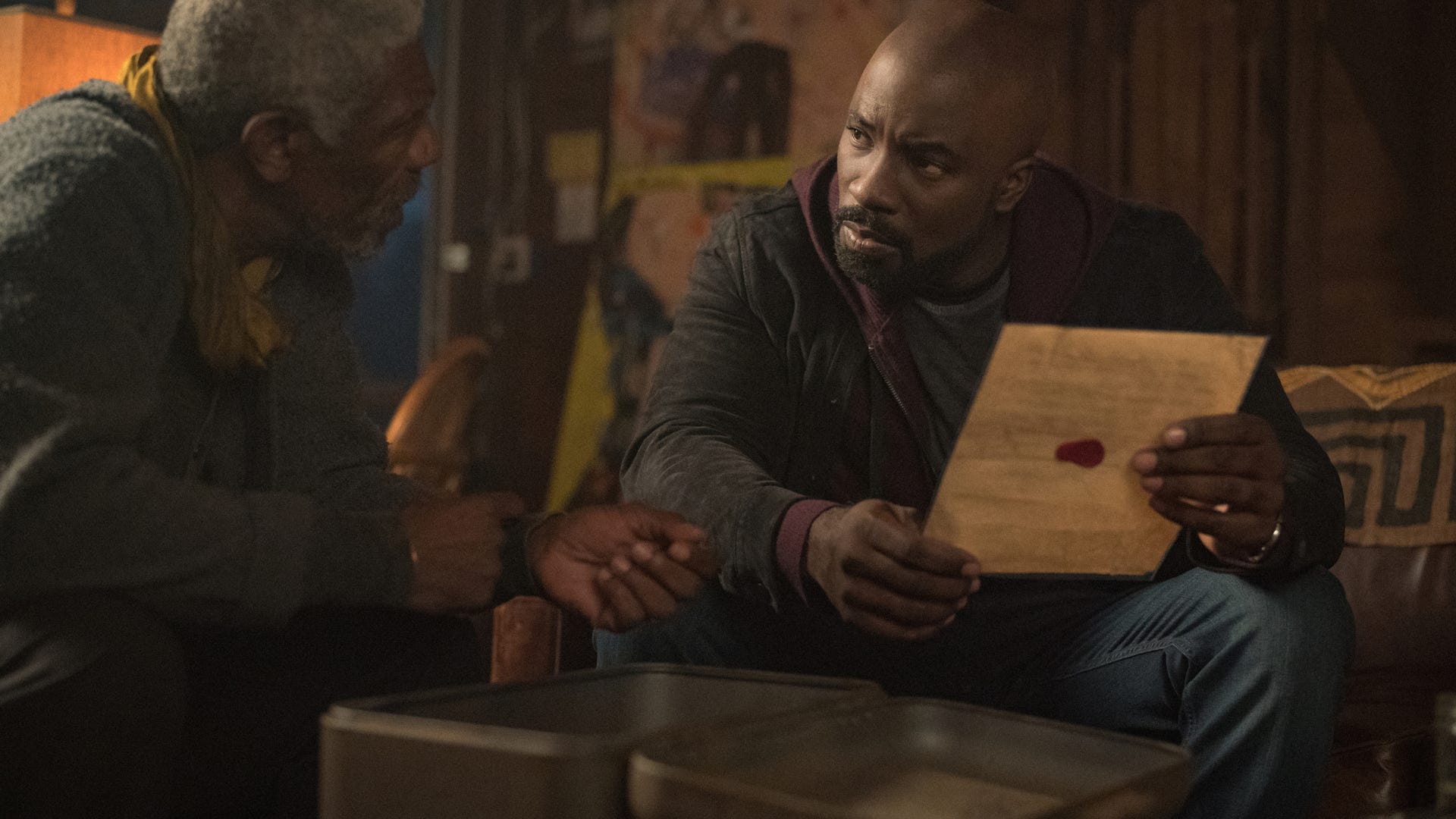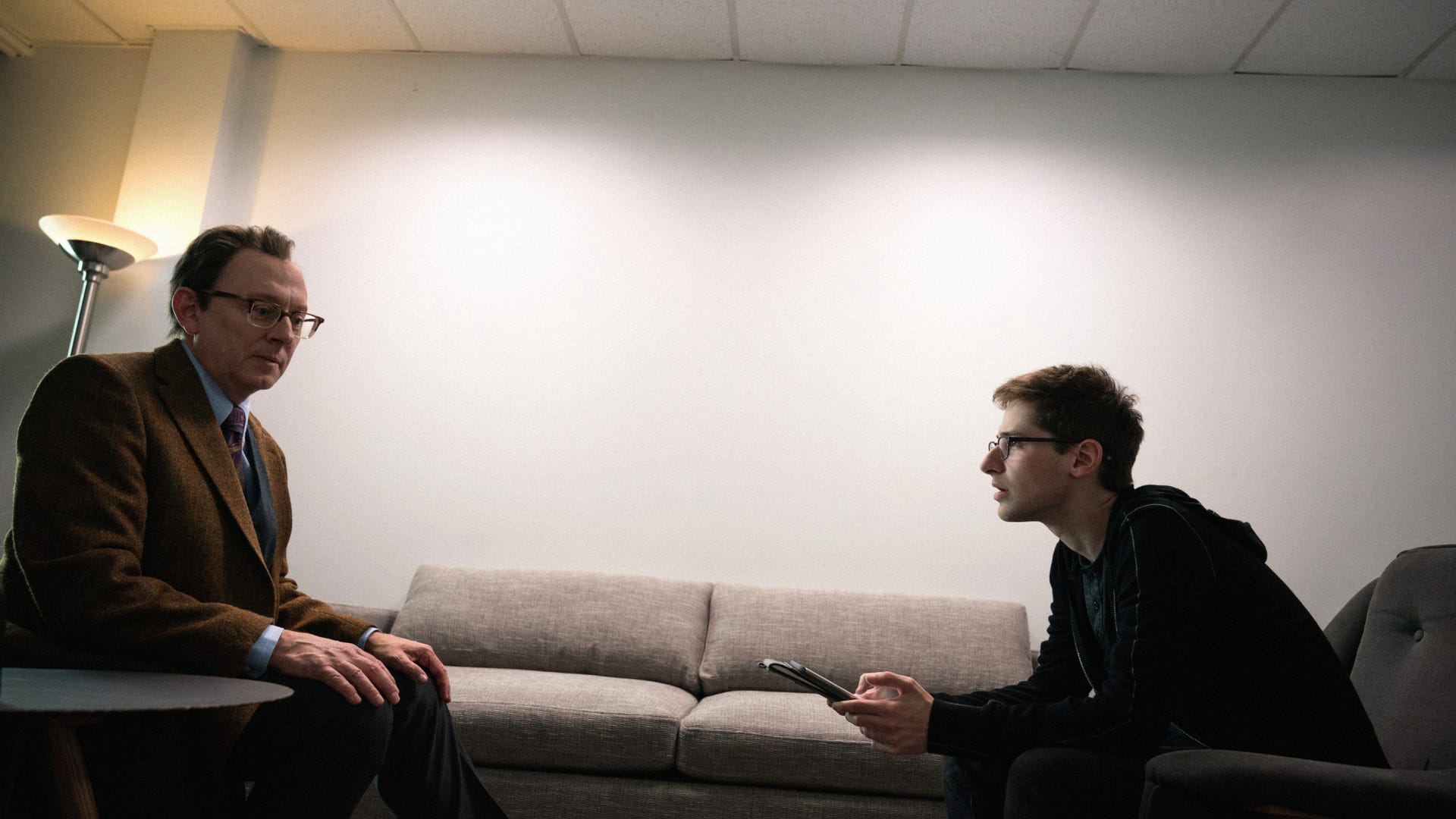Join or Sign In
Sign in to customize your TV listings
By joining TV Guide, you agree to our Terms of Use and acknowledge the data practices in our Privacy Policy.
5 Ways Evil Has Proven Procedurals Can Still Be Woke and Relevant as Hell
The series has a lot more on its mind than exorcisms
On the surface, Evil is a show about demonic possessions, exorcisms, angels, and the Catholic Church's investigations into hard-to-prove phenomena. But watch a couple of episodes and you will quickly discover there is a lot more to this freshman drama than Biblical boogeymen.
Sure, we love the romantic tension between the main characters -- Dr. Kristen Bouchard (Katja Herbers) and David Acosta (Mike Colter) -- and that tension just seems to get stronger every week. She's married with kids, and he's still mourning the deceased love of his life. She's white. He's black. She's a lapsed Catholic, and he's studying to be a priest. But despite all of their differences, David and Kristen truly like and respect each other and are committed to finding the truth.
And as it turns out, it's impossible to find the truth about the nature of evil without tackling issues like racism, sexism, healthcare discrimination, and toxic masculinity. But creators Michelle and Robert King -- who also created acclaimed CBS series The Good Wife, the short-lived CBS political satire BrainDead, and the current CBS All Access drama The Good Fight -- say they didn't start from a point of pushing for cultural mindfulness.
"We didn't set out to make the show socially conscious, but we did want the show to bounce back and forth between possible supernatural explanations for evil and psychological or empirical reasons. And the latter tends to slide toward evil with a small 'e,' " Michelle King told TV Guide over email. Evil, she explained, "deals with original sin, but also with ethics of everyday life. That's why we deal with issues like racism, horrible bosses, pedophiles on the internet, and lone gunmen. They are the demons and goblins of everyday life."
With that in mind, here are five issues Evil has tackled that prove just how woke this show is.
1. The legacy of slavery

Vondie Curtis-Hall, Mike Colter, Evil
Elizabeth FisherIn the eighth episode of Evil, titled "2 Fathers," David and Kristen investigated a sigil from the demonic Poveglia Codex that looks just like a symbol found on the paintings made by David's artist father, Leon (Vondie Curtis-Hall). While digging for the truth at Leon's artist commune, David and Kristen unwittingly drank sangria laced with a hallucinogenic. In the aftermath, Kristen saw a woman give birth to a demon, while David met and danced with a woman he later learned was the ghost of his enslaved ancestor. In a conversation with his father, David discovered that the sigil his father now uses in his art first came from a slaveowner, leading to a debate between David and Leon about whether a painful history can be reclaimed and turned into a symbol of resilience. Their thought-provoking discussion about the inhumane treatment their ancestor suffered subtly but effectively personalized just how evil American slavery was and how it echoes through the generations. The conversation made the episode one of the show's best, if not the best, yet.
2. Toxic masculinity

Michael Emerson, Noah Robbins, Evil
ELIZABETH FISHERIt wasn't clear at first what Leland (Michael Emerson) was trying to do when he approached the hacker Sebastian (Noah Robbins) in Episode 7, "Vatican III." But when a coffee barista turned down Sebastian for a date, Leland wasted no time manipulating the young man's anger over the rejection and his toxic belief that the barista "owed" him affection. After convincing Sebastian to play a disgusting prank on the barista, Leland used "therapy" sessions with Sebastian to fuel and weaponize his insecurities until he was malleable enough to take the next step. In "Exorcism Part 2," Leland ordered Sebastian to purchase a small arsenal with the intent to use the guns to shoot and kill women at a prayer group led by David. As Sebastian prepares to carry out the mission, he accidentally shoots himself in the head. And while Leland is annoyed at the delay this causes his evil plan, he heads online, where he's met with a seemingly endless number of men just like Sebastian who would make perfect recruits.
What makes this storyline so striking is how tragically timely it is. There is a very real faction of society that views the term "toxic masculinity" as an attack on manhood and who share Sebastian's views on what women "owe" them. For every step forward taken by #MeToo and other movements for change, there will always be those who refuse to give up male privilege and control, and those who will react violently when these things are threatened. This is precisely why Leland's chosen method of grooming incels -- particularly his use of online communities -- is so terrifying, because it taps into something we're seeing play out in reality right now.
3. Racial discrimination in healthcare

Hannah Hodson, Mike Colter, Katja Herbers, Evil
ELIZABETH FISHERIn the second episode, "177 Minutes," David and Kristen investigated a possible miracle: the mysterious resurrection of a teenager, Naomi (Hannah Hodson), who had been pronounced dead nearly three hours before waking up. She turned out to have undiagnosed COPD, a lung disease that makes it difficult to breathe, which the hospital argued had simply caused her to appear dead when she wasn't -- but David also realized while examining surveillance footage that doctors at the hospital spent, on average, 35 more minutes resuscitating white patients than they did on patients of color. If they had spent the same time trying to save Naomi, who is black, that they did on white patients, she never would have been declared dead. David confronted the hospital's administrator about the discrimination, and Naomi and her family gained one hell of a lawsuit to lodge against the hospital. In keeping with how Evil bounces between supernatural and grounded explanations, the episode didn't solve every mystery of how Naomi woke up. (Did a woman who died in the hospital before she did help save her?!) But when it came to the issue of racism and discrimination in healthcare, the episode couldn't have been more clear, shining an intelligent spotlight on a problem that occurs all too often in real life.
4. TV's emasculation of Asian men

Nicole Shalhoub, Aasif Mandvi, Evil
Jeff NeumannWhen Ben (Aasif Mandvi) made a guest appearance as a professional skeptic on a ghost-hunting show in Episode 5, titled "October 31," he fell for one of its stars, Vanessa (Nicole Shalhoub). The two had a complicated romantic entanglement involving Vanessa's ghost sister -- don't ask -- but the more fascinating development between them occurred when Vanessa called out a producer for making Ben's voice sound high-pitched in post-production. The producer, a white man, apparently had a track record for emasculating men of color by tampering with their voices. And when Vanessa, a woman of color, noticed that the producer was making Ben sound afraid when in fact he wasn't, she destroyed the audio.
The emasculation of Asian men is an unfortunate trend on TV and in movies. Sixteen Candles' Long Duk Dong is one of the worst modern examples, but as writer Thessaly La Force wrote in the New York Times Style Magazine in 2018, Hollywood's offensive Asian stereotypes date back to the 1920s, with characters like the villainous Fu Manchu and the subservient Charlie Chan. Chef and TV personality Eddie Huang wrote in a 2017 New York Times op-ed, "Every Asian-American man knows what the dominant culture has to say about us. We count good, we bow well, we are technologically proficient, we're naturally subordinate, our male anatomy is the size of a thumb drive, and we could never in a thousand millenniums be a threat to steal your girl." Evil counters that trend with Ben, a well-rounded Asian man who is definitely not sexless, but it also uses his storyline to expose bigger problems in the messages pop culture sends to men of color.
5. Inhumane treatment of immigrants

Katja Herbers, Mike Colter, Li Jun Li, Evil
ELIZABETH FISHERGrace (Li Jun Li), a Chinese immigrant, claims to have a direct line to God and even saved one woman's life with a vision she received in Episode 6, "Let X = 9." Her abilities captured the attention of Church officials, who wondered how she was able to complete and decode pages of the Poveglia Codex, which has been locked up for centuries. But just as Grace started to make real headway on the codex, ICE agents arrived to deport her. When David and Kristen visited Grace before her deportation, the detention center guards were rude, unfeeling, and mysterious. One of them also turned out to be in Leland's inner circle -- he was the expert marksman Leland introduced Sebastian to -- which directly links the immigration system with the most evil, demonic forces on the show. Leave it to Evil to juxtapose an innocent and helpful person like Grace getting locked away while evil imps like Leland roam the streets of New York and cause discord.
These are far from the only issues Evil has tackled in its first season, and the series isn't slowing down yet. Following Thursday's fall finale, there are three episodes remaining in Season 1, and Michelle King teased that one will be an "intense and frightening" story about the Rwandan genocide. Another will return to the healthcare industry and touch on how doctors patronize women, especially pregnant women.
Even with all of these hot-button topics on the table, the Kings say the riskiest episodes could be yet to come. "We wanted the first year to thematically address the idea of innocence under attack, so that kept us on a certain track," Robert King told TV Guide over email. "Our guess is that didn't push us into as many dangerous areas. But maybe next year we can address certain political issues and that might become more worrisome."
Evil airs Thursdays at 10/9c on CBS.
(Disclosure: TV Guide is owned by CBS Interactive, a division of ViacomCBS.)
